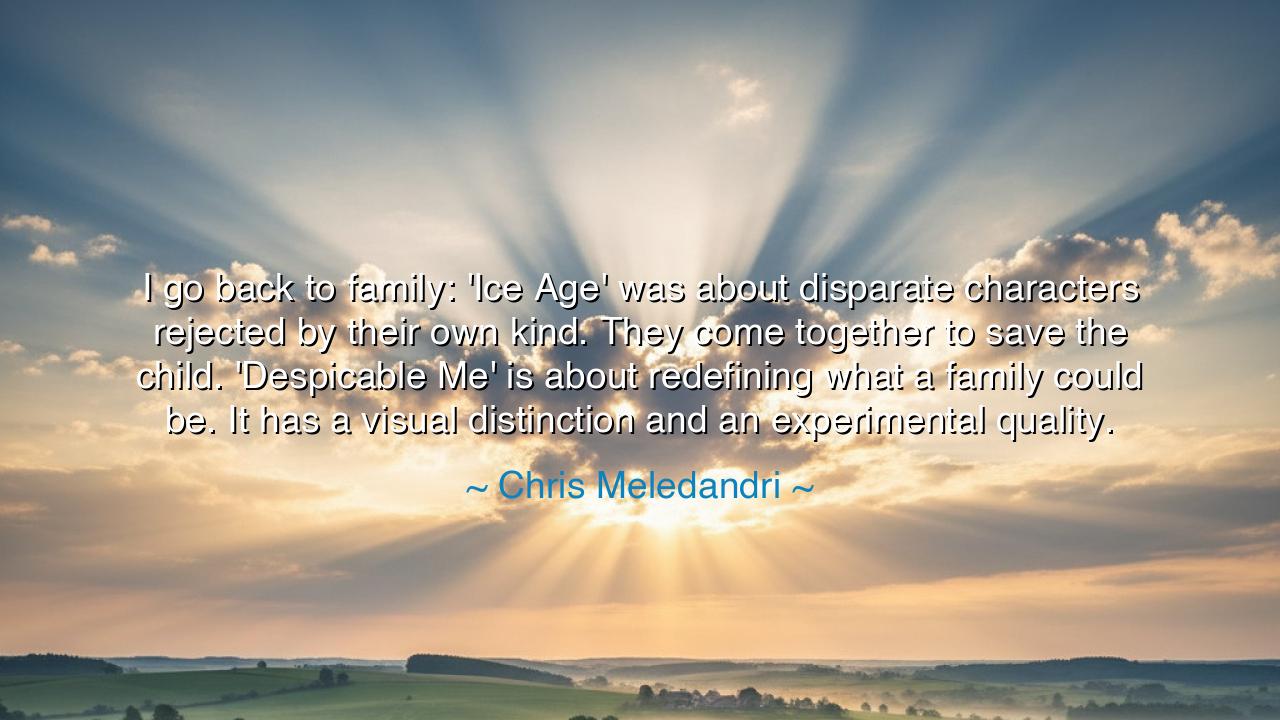
I go back to family: 'Ice Age' was about disparate characters
I go back to family: 'Ice Age' was about disparate characters rejected by their own kind. They come together to save the child. 'Despicable Me' is about redefining what a family could be. It has a visual distinction and an experimental quality.






When Chris Meledandri said, “I go back to family: ‘Ice Age’ was about disparate characters rejected by their own kind. They come together to save the child. ‘Despicable Me’ is about redefining what a family could be. It has a visual distinction and an experimental quality,” he was not simply describing the themes of his films — he was revealing the essence of storytelling itself. In his words lies a philosophy that reaches beyond cinema: that all creation, all art, all striving of the human heart, returns at last to the question of family — not merely by blood, but by bond, by shared struggle, and by chosen love.
To speak of family, as Meledandri does, is to speak of the center of existence. The ancients believed that the family was the first and most sacred order, the place where the soul learned duty, affection, and sacrifice. Yet Meledandri sees something even deeper: that family is not static, but a living, transformative idea. In Ice Age, the mammoth, the tiger, and the sloth — creatures of different natures, cast out from their own — find meaning not in survival alone, but in unity. They save a child not of their kind, and in doing so, redeem themselves. In this story lies the oldest moral truth: that we are made human not by kinship of blood, but by acts of compassion and courage.
Then came Despicable Me, where Meledandri and his team dared to redefine what a family could be. Here, the villain Gru — master of mischief, armed with pride and ambition — finds salvation not through conquest, but through love. The orphans he adopts do not fit into his world; instead, they reshape it, melting the armor of his heart. In their laughter, he rediscovers joy; in their need, he discovers purpose. The lesson is profound: that even the coldest soul, when touched by love, can become a parent, a protector, a creator of belonging.
What Meledandri calls “visual distinction and experimental quality” reflects his belief that form must serve meaning. The wild landscapes of Ice Age mirror the vast loneliness of exile; the sharp, colorful chaos of Despicable Me mirrors the transformation of a rigid man into a joyous father. Each artistic choice — every line, every tone, every rhythm — exists not for spectacle alone, but to embody the emotional truth of family: that through difference comes unity, through imperfection comes beauty. This is not animation for children alone; it is myth made modern, teaching through laughter what philosophy teaches through words.
The origin of this quote arises from Meledandri’s reflections as a filmmaker who built worlds that resonated with the human heart. He understood that stories survive not by novelty, but by recognition — that deep, almost spiritual connection audiences feel when they see their own longing mirrored on the screen. The characters who are “rejected by their own kind” are metaphors for every outcast, every dreamer, every person who has sought love in a world that did not at first understand them. His films speak to the eternal truth that family is not given, but forged through courage and acceptance.
History, too, bears witness to this idea. Consider Romulus and Remus, the mythical founders of Rome. Abandoned as infants, they were raised not by parents but by a she-wolf — nurtured by the wild, shaped by struggle. From that unlikely beginning, they built an empire. Their tale, like Meledandri’s films, reveals a universal theme: that family is not confined to origin, but discovered through destiny. The bonds we make through loyalty, sacrifice, and love often prove stronger than those of birth.
And so, the lesson to be drawn from Meledandri’s words is clear: seek your family not only among those who resemble you, but among those who complete you. In your journey through life, you will meet others who, like the mammoth or the villain, walk alone, misunderstood, or hardened by pain. To reach out, to build connection, to make a home in the hearts of others — this is the true work of the soul. Whether through art, kindness, or courage, build circles of belonging. For the measure of one’s greatness is not found in what one creates alone, but in the family one forms through love.
Thus, as Meledandri teaches, every great story — whether told in the ice or under the stars — is, at its heart, the story of coming together. Let this wisdom guide you: cherish the family you have, and create the family you need. For in the end, it is love that binds the scattered, courage that redeems the lost, and compassion that transforms the outcast into kin.






AAdministratorAdministrator
Welcome, honored guests. Please leave a comment, we will respond soon